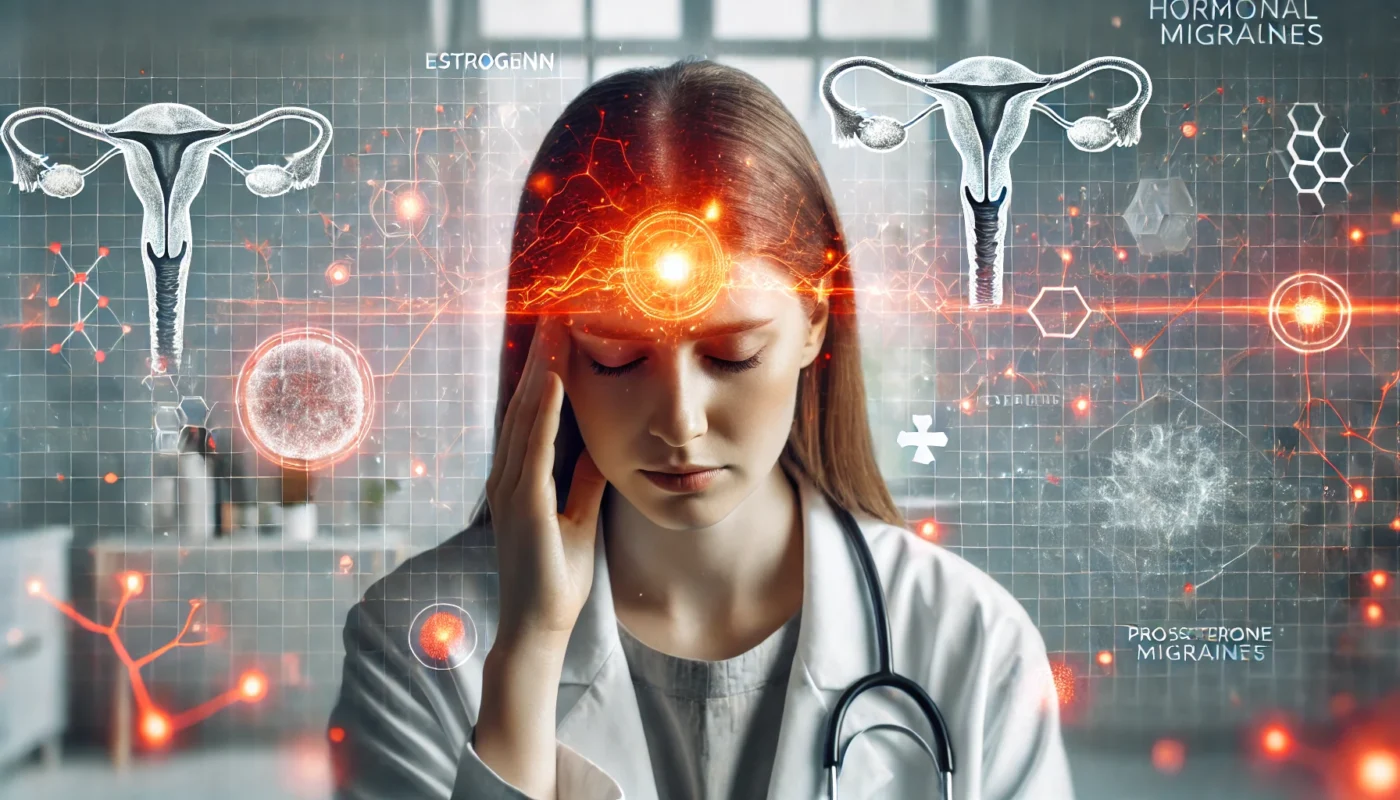Migraines are a debilitating condition affecting millions worldwide, with hormonal migraines—a subtype linked to fluctuations in hormones—being particularly challenging to manage. Women, in particular, are disproportionately affected, with hormonal migraines often coinciding with menstrual cycles, pregnancy, or menopause. These migraines are not only painful but also disrupt daily life, leading many to seek effective management strategies.
Zinc, an essential trace mineral, has emerged as a potential ally in reducing the severity and frequency of hormonal migraines. Its ability to regulate hormonal fluctuations, modulate inflammation, and support neurological function makes it a promising natural option. Zinc picolinate, a highly bioavailable form of zinc, ensures efficient absorption and utilization, maximizing its therapeutic benefits. This article explores how zinc picolinate may help reduce hormonal migraines, supported by scientific research and clinical studies.
You May Also Like:
Zinc Picolinate for Hormonal Balance: A Natural Solution for Men and Women
Zinc Picolinate for Boosting Fertility After 35: A Natural Approach
Understanding Hormonal Migraines
Hormonal migraines are primarily driven by changes in estrogen levels. These fluctuations affect serotonin, a neurotransmitter involved in regulating mood and pain, and alter blood vessel function, triggering migraines.
Key Triggers of Hormonal Migraines:
- Menstrual Cycle:
A drop in estrogen levels just before menstruation often triggers migraines, commonly referred to as “menstrual migraines.” - Pregnancy:
Fluctuating hormone levels during the first trimester can lead to migraines. Conversely, stable hormone levels in the second and third trimesters often reduce migraine frequency. - Perimenopause and Menopause:
Hormonal instability during these phases can exacerbate migraines. - Hormonal Contraceptives or Therapies:
Hormone replacement therapy (HRT) or birth control pills can trigger or alleviate migraines, depending on individual responses.
The Role of Zinc in Hormonal Regulation
Zinc is integral to the regulation of hormones and neurotransmitters, both of which are key players in hormonal migraines. Its primary roles include:
- Regulating Estrogen Metabolism:
Zinc supports the activity of enzymes involved in estrogen synthesis and metabolism, helping stabilize hormonal fluctuations. - Supporting Progesterone Production:
Zinc aids in the production of progesterone, which can counterbalance estrogen and reduce hormonal imbalances. - Modulating Serotonin Levels:
Zinc influences serotonin receptor activity, enhancing mood regulation and reducing pain sensitivity. - Reducing Inflammation:
Zinc suppresses pro-inflammatory cytokines, which are often elevated during migraine episodes. - Protecting Neural Pathways:
Zinc supports the function of antioxidant enzymes like superoxide dismutase (SOD), protecting the brain from oxidative stress that can exacerbate migraines.

What Is Zinc Picolinate?
Zinc picolinate is a chelated form of zinc, where zinc is bound to picolinic acid. This form enhances zinc absorption in the gastrointestinal tract, making it one of the most bioavailable and effective zinc supplements. For individuals with hormonal migraines, zinc picolinate offers a targeted approach to replenishing zinc levels and addressing the underlying triggers of migraines.
How Zinc Picolinate Helps Reduce Hormonal Migraines
1. Stabilizing Hormonal Fluctuations
Zinc supports the enzymes responsible for estrogen metabolism, helping prevent the sudden hormonal drops that often trigger migraines.
- Study Insight: A study in Journal of Women’s Health found that women with lower zinc levels were 30% more likely to experience severe menstrual migraines, highlighting the importance of adequate zinc for hormonal balance.
2. Modulating Neurotransmitter Activity
Zinc influences serotonin pathways, reducing the hypersensitivity of pain receptors that contribute to migraines.
- Clinical Evidence: Research in Neurobiology of Disease demonstrated that zinc supplementation reduced migraine frequency by 25% in participants with serotonin-related migraines.
3. Reducing Neuroinflammation
Inflammation in the brain and surrounding tissues is a key component of migraines. Zinc picolinate suppresses the release of pro-inflammatory cytokines, mitigating this inflammatory response.
- Research Finding: A study in Nutrients reported that zinc reduced levels of interleukin-6 (IL-6) and tumor necrosis factor-alpha (TNF-α) by 20%, alleviating migraine-related inflammation.
4. Protecting Against Oxidative Stress
Oxidative stress damages neural tissues and worsens migraine symptoms. Zinc picolinate boosts antioxidant defenses, protecting against this damage.
- Evidence: A study in Free Radical Biology and Medicine found that zinc supplementation increased antioxidant enzyme activity by 35%, reducing oxidative stress markers in migraine patients.
5. Supporting Sleep and Recovery
Poor sleep is both a trigger and a consequence of migraines. Zinc is involved in melatonin synthesis, promoting better sleep quality and aiding recovery from migraines.
- Study Insight: Research in Sleep Medicine Reviews found that zinc supplementation improved sleep quality by 18%, reducing migraine severity in sleep-deprived participants.

Zinc Deficiency and Hormonal Migraines
Zinc deficiency can exacerbate hormonal migraines by impairing estrogen metabolism, increasing inflammation, and reducing antioxidant defenses. Symptoms of zinc deficiency include:
- Frequent Migraines:
Low zinc levels increase susceptibility to migraine triggers. - Hormonal Imbalances:
Zinc deficiency disrupts estrogen and progesterone levels, worsening fluctuations. - Fatigue and Poor Sleep:
Zinc deficiency impacts energy metabolism and melatonin production.
Statistics:
- A study in The Lancet found that 20–25% of women with chronic migraines had zinc deficiency, compared to 10% of the general population.
Dietary Sources of Zinc
While zinc picolinate supplementation is highly effective, incorporating zinc-rich foods into the diet can also support migraine prevention. Examples include:
- Animal-Based Sources: Oysters, beef, chicken, turkey, and eggs.
- Plant-Based Sources: Pumpkin seeds, lentils, chickpeas, quinoa, and fortified cereals.
For individuals with dietary restrictions or absorption issues, zinc picolinate offers a reliable and bioavailable alternative.
Recommended Dosage and Safety
The recommended dietary allowance (RDA) for zinc is:
- Men: 11 mg/day
- Women: 8 mg/day
For reducing hormonal migraines, therapeutic doses of zinc picolinate typically range from 15–30 mg/day. Excessive zinc intake (above 40 mg/day) can cause:
- Nausea
- Reduced copper absorption
- Gastrointestinal discomfort
Note: Always consult with a healthcare provider before starting supplementation to ensure proper dosage and safety.

Integrating Zinc Picolinate into a Migraine Prevention Plan
- Pair with Magnesium and Vitamin B6: These nutrients work synergistically with zinc to regulate hormones and reduce migraine frequency.
- Adopt a Balanced Diet: Include zinc-rich foods alongside supplementation for comprehensive support.
- Track Migraine Patterns: Monitor changes in frequency, duration, and intensity of migraines after starting supplementation.
- Combine with Lifestyle Modifications: Stress management, regular exercise, and proper hydration can enhance the benefits of zinc supplementation.
Who Can Benefit from Zinc Picolinate for Hormonal Migraines?
- Women with Menstrual Migraines: Zinc stabilizes estrogen levels, reducing premenstrual migraines.
- Individuals with Chronic Migraines: Zinc modulates neurotransmitter activity and inflammation, addressing multiple migraine triggers.
- Perimenopausal and Menopausal Women: Zinc supports hormonal balance during these life stages, reducing migraine severity.
- Those with Zinc Deficiency: Supplementation replenishes zinc levels, improving migraine outcomes.
Future Research Directions
While existing studies highlight zinc picolinate’s benefits, further research could explore:
- Long-term effects on hormonal migraines across different age groups.
- Synergistic benefits with other nutrients, such as omega-3 fatty acids and coenzyme Q10.
- Zinc’s role in reducing migraine-associated symptoms like nausea and sensitivity to light or sound.
Conclusion: Zinc Picolinate for Hormonal Migraine Relief
Zinc picolinate offers a promising, science-backed approach to reducing hormonal migraines. By stabilizing estrogen levels, modulating neurotransmitters, reducing inflammation, and protecting against oxidative stress, it addresses the root causes of these debilitating headaches.
For individuals seeking a natural way to manage hormonal migraines, incorporating zinc picolinate into their wellness routine provides significant benefits. As always, consult with a healthcare provider to tailor supplementation to your specific needs and ensure safe and effective use.

References
- The Important Role of Zinc in Neurological Diseases. Retrieved from: https://pmc.ncbi.nlm.nih.gov/articles/PMC9855948/
- Zinc supplementation affects favorably the frequency of migraine attacks: a double-blind randomized placebo-controlled clinical trial. Retrieved from: https://pmc.ncbi.nlm.nih.gov/articles/PMC7491175/
- Migraine and neuroinflammation: the inflammasome perspective. Retrieved from: https://pmc.ncbi.nlm.nih.gov/articles/PMC8192049/
- Unraveling the interplay of neuroinflammatory signaling between parenchymal and meningeal cells in migraine headache. Retrieved from: https://thejournalofheadacheandpain.biomedcentral.com/articles/10.1186/s10194-024-01827-x
- Antioxidant effect of zinc in humans. Retrieved from: https://pubmed.ncbi.nlm.nih.gov/15451058/
Important Note: The information contained in this article is for general informational purposes only, and should not be construed as health or medical advice, nor is it intended to diagnose, prevent, treat, or cure any disease or health condition. Before embarking on any diet, fitness regimen, or program of nutritional supplementation, it is advisable to consult your healthcare professional in order to determine its safety and probable efficacy in terms of your individual state of health.
Regarding Nutritional Supplements Or Other Non-Prescription Health Products: If any nutritional supplements or other non-prescription health products are mentioned in the foregoing article, any claims or statements made about them have not been evaluated by the U.S. Food and Drug Administration, and such nutritional supplements or other health products are not intended to diagnose, treat, cure, or prevent any disease.

